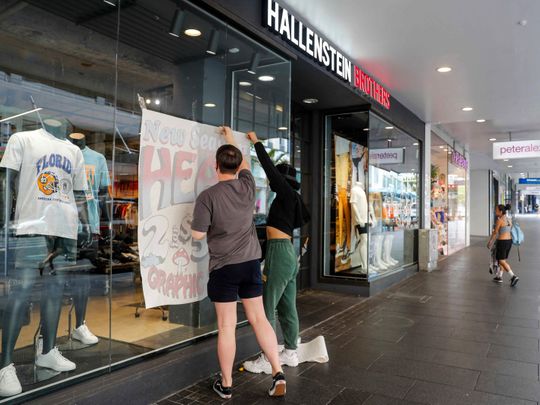
Wellington: New Zealand will ease COVID-19 restrictions in its biggest city from Wednesday as vaccinations rates rise and lockdown measures will likely be phased out by the end of the month, Prime Minister Jacinda Ardern said.
The city of Auckland has been in lockdown for nearly three months as the infectious Delta variant of the coronavirus spread, infecting more than 4,500 people since August in New Zealand’s worst phase of the pandemic.
But a pick-up in vaccination rates and mounting pressure from critics calling for more freedoms, have prompted Ardern to end the curbs.
“Auckland has worked so hard to get their vaccination rates high, they deserve to be able to move as soon as they hit those targets regardless of what’s happening in the rest of the country,” Ardern told a news conference on Monday.
Auckland’s vaccination rate rose to 90% for first doses over the weekend, Ardern said, and there is a strong expectation it will reach a target of 90% for second doses by November 29.
Once Auckland reaches that 90% second-dose target, it will move into a new “traffic-light” system to manage outbreaks rather than tough lockdown measures.
Ardern said shops and malls can reopen in Auckland from Wednesday. Libraries, museums and zoos can also open and outdoor gatherings of up to 25 people will be allowed.
But the border controls between Auckland and the rest of the country remains in place and a decision on when this will be eased will be announced next week, Ardern said.
Once the poster child for stamping out COVID-19, New Zealand has struggled with the Delta variant, particularly in Auckland, forcing a rethink of a strategy to eliminate the virus.
Australia, meanwhile, began administering booster shots of Pfizer’s COVID-19 vaccine on Monday as millions of people in its largest city, Sydney, woke up to more freedom amid an accelerating immunisation drive.
Australia’s vaccination rate has picked up pace since July, after widely missing its initial targets, when its southeast was hit by a third wave of infections triggered by the highly infectious Delta variant forcing months-long lockdowns.
Sydney and Melbourne, its largest cities and worst hit by the Delta wave, have been racing through their inoculations before gradually relaxing restrictions. Life returned close to normal on Monday in New South Wales, home to Sydney, as the state nears its 90% dual-dose vaccinations in people above 16.
“There’s a sense of optimism and enthusiasm with the customers. They are showing up in droves and they’re not afraid to spend,” said Rodney Sen, owner of the Barzura restaurant in Sydney’s eastern suburbs.
There are now no limits on the number of fully vaccinated guests at homes, while restaurants and entertainment venues can allow more patrons. Stadiums can operate at full capacity.
After more than 18 months of some of the world’s strictest containment policies, border restrictions have started to ease, setting in motion a plan to reopen the country to travellers amid a gaping hole in the market for casual workers.
Sen told Reuters on Monday that the restaurant had increased its pay rates to retain and attract staff.
“The public have actually got the money to spend, however we are struggling to find the staff to serve them. This is a very familiar story in the restaurant industry through Sydney,” he said.
With about 181,600 cases and 1,827 deaths, Australia’s coronavirus numbers are among the lowest in the developed world.
Most new cases are being detected in Victoria, which logged 1,126 new cases on Monday. Neighbouring New South Wales reported 187 infections. Other states and territories are COVID-free or have very few cases.
The booster doses will be given to people 18 and over who took their second shot more than six months ago.








